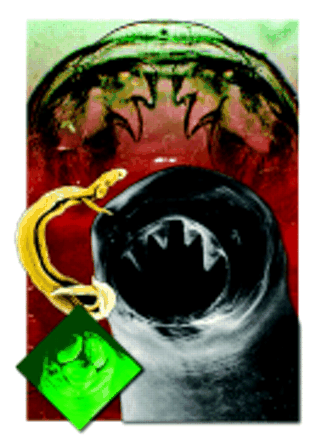Biology that Asks, “What's Eating You?”

In order to maintain transplanted organs, powerful immuno-suppressive drugs must generally be administered, and most transplant patients find it difficult to adhere to their prescribed regimen. Can alternative methods be exploited that would allow an organ to survive in a foreign host? In Parasite Rex, Carl Zimmer proposes to look to human parasites for clues. The consideration of immunosuppression, however, is just one of the many scientific pearls in this truly gripping book, which flows smoothly amid the scientific, practical, and even terrifying aspects of parasites.
Zimmer presents parasites as mighty interlopers in the Darwinian model of evolution. Sometimes invisibly, and sometimes all too graphically, parasites force otherwise healthy hosts to become vehicles of the parasitic lifecycle. Zimmer writes, “The thinning of the herd is an illusion, not the service of the predator, but the side effect of a [parasite] traveling through its life.” The author also persuasively argues that sex evolved as a way for hosts to optimize the genetic variability of their offspring and thereby avoid any single, highly prevalent phenotype that could be readily targeted by parasites. Even recently, parasites have affected the evolutionary course of certain human populations, as evidenced by anti-malarial genes such as those associated with the sickle cell trait. In fact, Zimmer surmises, the human organism may be so genetically programmed to fight parasites, that their absence may sometimes lead the immune system to cause, rather than prevent, disease.
To illustrate his points, Zimmer plunges us deep into tropical sites, such as southern Sudan, Madagascar, and Costa Rica, that provide the ground zero of parasite exploration. He describes in detail the methods of parasitology and depicts the hardships that scientists must endure in order to discover parasites and assess the fates of their woeful hosts. Many of the depictions offer dramatic, new perspectives on biology, and in this regard the author quotes biologist Daniel Janzen: “[M]y vision of a mouse is changed forever. Now I see it as a bag of tapeworms and nematodes.” The author's specific accounts yield highly readable and entertaining descriptions, both of host immune defenses and of the elegant methods parasites have evolved to evade them.

Parasites are also discussed as useful biological tools. In many instances, parasites have been used to control pest species that have escaped their native habitat. Zimmer vividly relates an account from the early 1980s, in which a parasite was used to save perhaps 200 million people from starvation. To his credit, the author balances this somewhat worshipful view of parasitology with presentations of biological control efforts gone awry, wiping out huge swaths of ecosystems.
Parasite Rex is a grand revision of both scientific and popular notions of parasites. It should inspire a number of budding biologists to consider parasitology, and should subtly introduce the marvels of this discipline into mainstream thought. Finishing with an unusual philosophical twist, the book is a thought-provoking and rewarding read from beginning to end.
John R. Pollard, MD, is a Resident in Neurology in the Department of Medicine at the University of Pennsylvania.
- © American Society for Pharmacology and Experimental Theraputics 2001



